2026 May Festival⇩
Past Festivals⇩
Friends⇩
‘Spirited’⇩
About us⇩
Contact us⇩

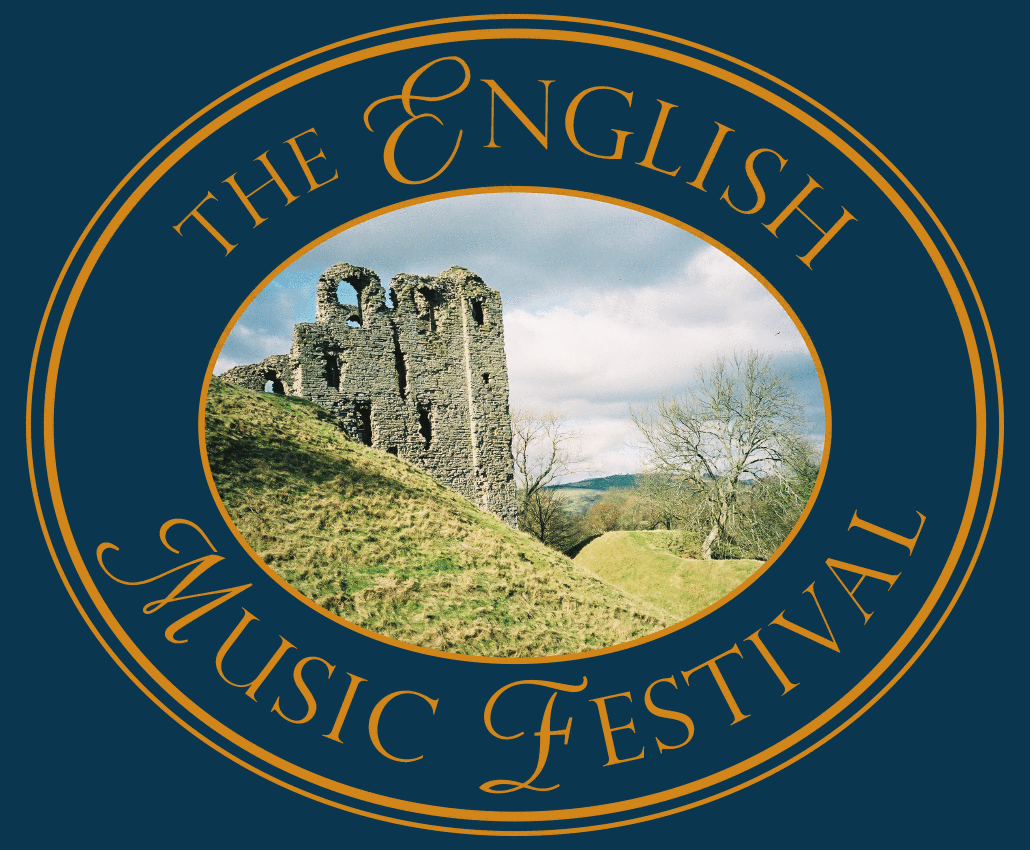
Another Festival; another success – a late May bank holiday weekend of superb music-making; interesting musical discoveries; fascinating talks to set the concerts in context; and typical EMF conviviality. And thanks to the grant-making Trusts, Funds and Societies who supported us, the members of our burgeoning Friends’ Scheme, healthy audience numbers and some generous donations from private individuals, the Festival reduced its expected £30,000 deficit (due to a large gap in funding created by the death of our sole major donor) to a loss only of £5,000.
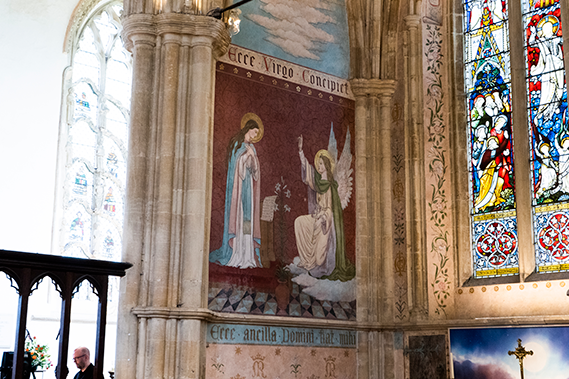
THE INTERIOR OF DORCHESTER ABBEY
Photograph | Matthew Johnson
The Festival commenced with perhaps the best-attended talk we have ever had. This was held, as usual, in the beautiful Village Hall at Dorchester-on-Thames, and took the form of a discussion between conductor Martin Yates and musicologist Lewis Foreman about the world première performances to be subsequently performed in Dorchester Abbey by the BBC Concert Orchestra. EMF Friends and Vice-Presidents then joined the Board of Trustees (now chaired by composer Richard Blackford) and EMF volunteers for the Garden Party kindly hosted in the lovely gardens of the Manor House. As usual, rosettes were handed out to those who had been members of the Friends’ Scheme for ten years, and I was afforded an opportunity to thank all those whose support keeps the Festival going. The sun came out from the behind the clouds it had been sheltering behind all day, and graced this convivial event with its warming rays.
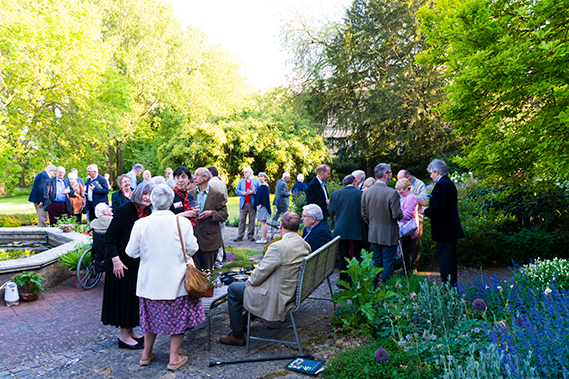
THE FRIENDS’ GARDEN PARTY
Photograph | Matthew Johnson
Over to the Abbey, then, for the first concert, after welcoming speeches from Rector Sue Booys and myself. This extremely well-attended event opened with the world première performance of Lord Berners’ exuberant Portsmouth Point, followed by Malcolm Arnold’s Serenade for small orchestra. The world première performance of Sir Charles Stanford’s Violin Concerto in D of 1875 closed the first half, with Russian violinist Sergey Levitin playing this remarkably assured work with passion and aplomb. The second half commenced with Ralph Vaughan Williams’s ravishing The Blue Bird (another world première); then we were treated to the gorgeous Song of Summer of Frederick Delius; and the concert concluded with our fourth world première performance – of Robin Milford’s Second Symphony. This contrasted movements of a rather classical and very string-filled sound with a dark and intense third movement, with almost uncanny and unnerving string effects followed by booming brass motifs. It was an intriguing and fascinating work and one which would well bear further hearings.
The next morning saw everyone back at the Abbey for a recital given by violinist Rupert Marshall-Luck and the pianist Michael Korstick, who had come over especially from Germany for the event. Cyril Rootham’s lovely Sonata in G minor (the performance of which particularly delighted and impressed the composer’s grandson, Dan Rootham) was followed by three works by the Israeli-French-British composer Nimrod Borenstein, who we were delighted to have with us: Nocturnal Fantasia, Souvenirs and Confession. After the interval came a new commission from another acclaimed contemporary composer, David Matthews – Variations for Violin and Piano on Roger Scruton’s ‘Despedida’ (in honour of Sir Roger Scruton’s 75th birthday). Both David Matthews and Sir Roger were present, making for a truly celebratory and joyous occasion. Finally, the world première performance of the Urtext edition (made by Marshall-Luck for G. Henle Verlag of Munich) of Sir Edward Elgar’s Violin Sonata. This presented the work in a new light, with the decades of editorial errors stripped away, returning the piece to Elgar’s original intentions. A large number of life-long concert-goers reported to me and to others that this was the single best performance of Elgar’s Violin Sonata that they had ever heard.
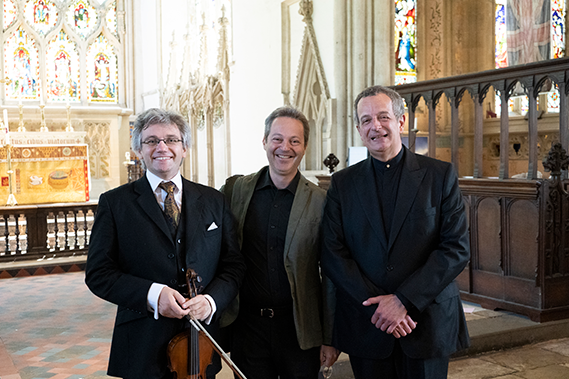
RUPERT MARSHALL‑LUCK, NIMROD BORENSTEIN AND MICHAEL KORSTICK
Photograph | Matthew Johnson
After lunch in one of the welcoming local hostelries, our audience returned to Dorchester Abbey to hear the Chapel Choir of Worcester College, Oxford in a programme entitled My eyes for Beauty Pine, with works by Charles Wood, Stanford, Frank Bridge, Herbert Howells, Sir Hubert Parry, John Sheppard, Thomas Tomkins, Thomas Tallis, Edward Bairstow and Milford; and which concluded with The Call and Antiphon from Vaughan Williams’s Five Mystical Songs. As part of the EMF’s on-going Educational Programme, pupils from a local state school, St Barnabas in Jericho, had been invited to take part in the concert. Prior to the concert itself they had been involved in rehearsals, and had been given a demonstration and short talk about the organ in Dorchester Abbey. Thanks to the generosity of those grant-making Trusts and Funds who supported our educational project, we were able to offer complimentary tickets to parents and siblings, many of whom were from low-income families. This may have been the first introduction to a classical concert that some of these children and parents have had. It had been reported to me by the conductor and by teachers at the school that the children were extremely excited and enthusiastic about this event and were overjoyed to be able to take part. The first work that involved them came at the start of the second half – Parry’s Long since in Egypt’s Plenteous Land from the oratorio Judith (the same tune as for the hymn Dear Lord and Father of Mankind). I found it immensely moving to see the commitment and obvious passion of the St Barnabas pupils (as well as, of course, of the excellent Chapel Choir), and was especially touched to note a boy from St Barnabas in the front row who, instead of holding his score in front of him and reading the words like the other children, had it held by his side, as he had clearly learnt all the words by heart. It was, overall, not just a lovely concert but a truly successful educational project, which completely fulfilled our aims of introducing this wonderful music to children who might otherwise not have the opportunity to hear it – let alone sing it in a concert setting. Singers, parents and the fairly numerous audience members all thoroughly enjoyed the event.
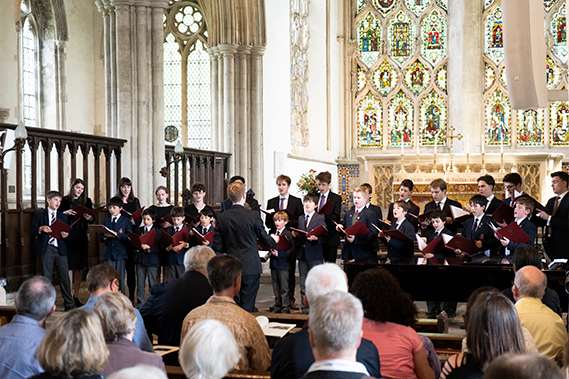
THE CHAPEL CHOIR OF WORCESTER COLLEGE, OXFORD
Photograph | Matthew Johnson
The talk in the Village Hall was given by Rupert Marshall-Luck on the subject of the new edition of the Elgar Sonata which he prepared for Henle, and the discoveries he had made along the way. The evening concert, back in the Abbey again, was given by the English Arts Chorale and Orchestra, conducted by Leslie Olive. They started with Ubi Caritas and The Lamb by Paul Carr, Birthday Song and Cradle Song by Sir Arthur Bliss, and Ola Gjeilo’s setting of Ubi Caritas. The pieces by Carr were especially beautifully sung and played. Then came the Vaughan Williams Oboe Concerto, with soloist Nicholas Daniel; one forgets, perhaps, what a gorgeous work this is, and its loveliness was enhanced tremendously by Daniel’s spectacularly good and impassioned performance. For very many audience members (of whom there were a goodly number), and for me myself, this was one of the highlights of the Festival. After the interval came Gerald Finzi’s lovely Prelude for Strings, The Unusual Quietness of Snow – the slow movement of Carr’s Oboe Concerto (also beautifully played by Daniel) – and finally Carr’s Stabat Mater, which was intensely emotionally charged, powerful and beautiful, and very well performed. This concert celebrated by the recent release by EM Records of a similar programme given by the same artists (EMRCD055: Radiance), and I was pleased to hear that we almost ran out of discs at the sales table, due to very high demand!
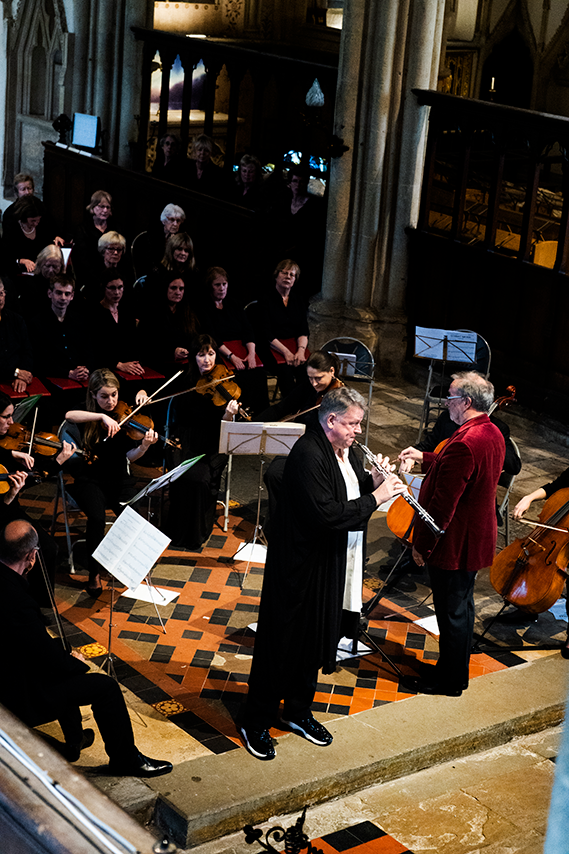
NICHOLAS DANIEL WITH THE ENGLISH ARTS ORCHESTRA
Photograph | Matthew Johnson
The late evening concert, held in a side chapel of the Abbey, was given by actor Lance Pierson and myself, and was a programme of poetry and prose with music as its subject. Authors ranged from A.A. Milne, Lewis Carroll and Edward Lear through to Thomas Hardy, John Dryden and Wendy Cope. The event was pleasingly well-received.
Sunday morning saw me fire-fighting various catering, administrative and artistic problems, while pianists Lynn Arnold and Charles Matthews gave a recital in the Silk Hall at Radley College of works by York Bowen, contemporary composer Francis Routh and Sir Donald Tovey, alongside a selection of Fantasy Waltzes by William Alwyn, Delius’s Eventyr and Bliss’s Rout. This attractive programme was apparently very well played.
The EMF Lunch followed, in the New Pavilion at Radley – sadly, not this time overlooking a cricket match, as the weather had turned drizzly and overcast; it was, nevertheless, another genial and companionable event. The afternoon concert took place back in the Silk Hall, with the Piatti Quartet giving an excellent account of Elgar’s String Quartet, Sir William Walton’s Second String Quartet, Benjamin Britten’s Divertimenti and Bridge’s Idylls.
In Dorchester-on-Thames, the afternoon talk was given by Chris Cope on Gustav Holst’s final years, and preceded a concert given by the Holst Orchestra, Godwine Choir and long-standing EMF conductor and supporter, Hilary Davan Wetton. This commenced with a very fine rendition of Dyson’s Hierusalem, before Elgar’s exquisite Love’s Tempest, Holst’s sparkling Brook Green Suite and Finzi’s Magnificat – a work which truly gives voice to Finzi’s particular and searingly beautiful sound-world. Howells’s Elegy followed, with Rupert Marshall-Luck the solo violist – another striking work. The second half opened with surely one of John Ireland’s best works, Greater Love, which was followed by Howells’s much-loved Like as the Hart, Holst’s I love my Love and Elgar’s Serenade for Strings. The last work of the concert was another real EMF discovery – the substantial and impressive Inscape by Edmund Rubbra, and we were pleased to have Rubbra’s son in attendance (as, indeed, we had been to have Bliss’s daughter with us earlier on in the day!).
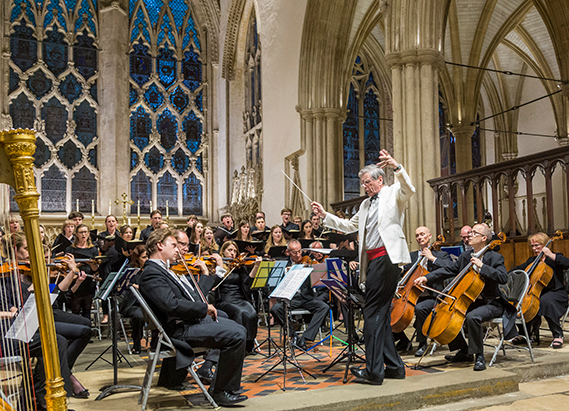
HILARY DAVAN WETTON CONDUCTS THE HOLST ORCHESTRA
Photograph | John Francis
For the late evening event I was thrilled to have the return of the New Foxtrot Serenaders in a programme of The Great British Songbook of the 1920s to the 1960s, featuring works by Ray Noble, Noël Coward, Ivor Novello and Flanagan & Allen, amongst others. As always, the songs were enhanced by the wit and repartee of the patter from band leader Graham Wright, and it was a toe-tappingly delightful evening.
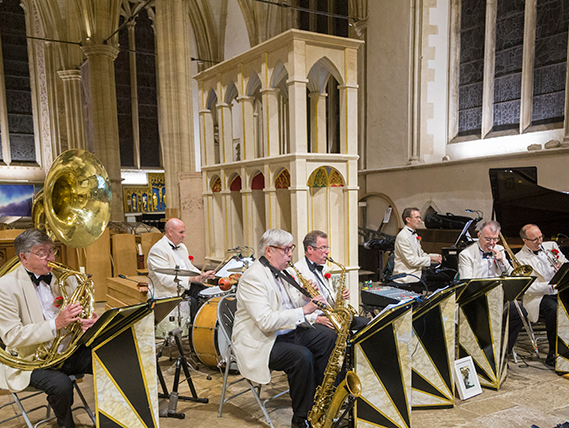
THE NEW FOXTROT SERENADERS
Photograph | John Francis
The final day of the Festival commenced with a song recital from Indian tenor Anando Mukerjee and Russian-born pianist Pavel Timofeyevsky. Howells’s Four Songs opened the programme, followed by Peter Warlock’s Folksong Preludes and Finzi’s song-cycle Oh fair to see. After the interval came the enchanting Venetian Songs by contemporary composer Ian Venables, who we had with us in the audience, followed by Ireland’s Songs Sacred and Profane, Howells’s Snapshots and Three Belloc Songs by Peter Warlock, which latter I particularly enjoyed. Mukerjee has a powerful voice and his pleasure in singing these wonderful songs was evident, and matched by the audience’s gratification in listening.
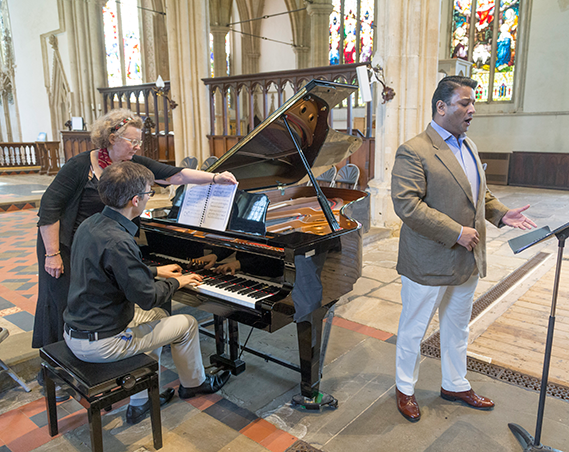
ANANDO MUKERJEE AND PAVEL TIMOFEYEVSKY
Photograph | John Francis
The afternoon concert took place in the glorious historical church of All Saints’ at nearby Sutton Courtenay, and featured soprano Sara Stowe, alto Lewis Spring, lutenist Sam Brown, and Matthew Spring, also on lute as well as viola da gamba. The attractive programme was entitled Like as the Lute Delights, and comprised lute songs and duets by John Dowland and John Danyel.
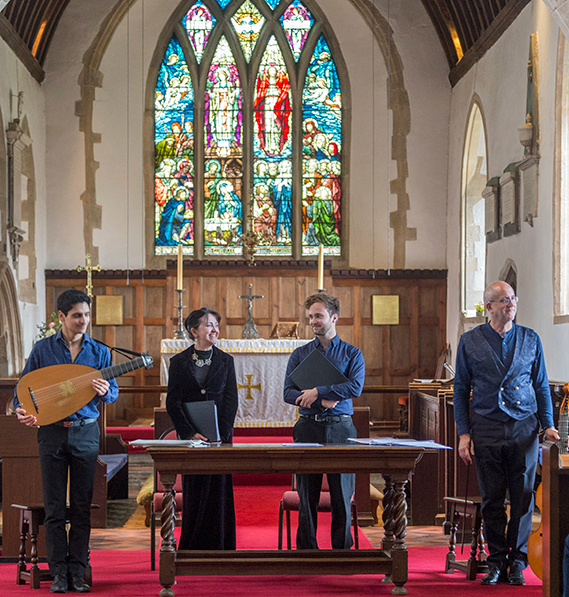
SAM BROWN, SARA STOWE, LEWIS SPRING AND MATTHEW SPRING
Photograph | John Francis
We had had a medical emergency which rendered Monday’s speaker unable to attend, so Rupert Marshall-Luck stepped into the breach with a talk on Parry’s music for violin and piano, as recently recorded on an EM Records disc (our first triple-disc set – EMRCD050–52: ‘The Wanderer’ – the Complete Works for Violin and Piano by Sir Hubert Parry).
The final concert of the Festival was given by the Chamber Ensemble of London, directed from the violin by Peter Fisher who, after the opening (and lovely) Pavane, Idyll and Bacchanal by Edgar Bainton, acted as the soloist in Delius’s idiomatic and characterfully entrancing Légende. Alwyn’s attractive Love Scene from The Fallen Idol was followed by Clive Jenkins’s lively and entertaining Sinfonietta for Strings (the composer also with us for this concert). After the interval we had three short pieces by Ireland, Cavatina, Soliloquy and Bagatelle, preceding Finzi’s Romance. Vaughan Williams’s Concerto Grosso closed the concert and the Festival, much to the joy and appreciation of all who attended. An excellent close to another highly enjoyable English Music Festival.
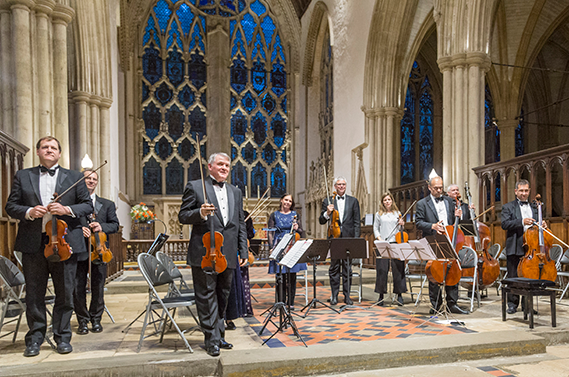
PETER FISHER AND THE CHAMBER ENSEMBLE OF LONDON
Photograph | John Francis
EM MARSHALL-LUCK | Founder-Director
We are delighted to announce that the EMF in 2026 will be held in the fabulous venue of DARTINGTON HALL in Devon, with concerts in the mediaeval Great Hall and talks in the delightful Ship Studio. The full programme is now available and can be viewed on this page. Please do come and join us for the most thrilling, convivial and exhilarating EMF yet!
Booking is now open for the 2026 May Festival for EMF Friends — general booking will open on 2 March. To purchase tickets through our website, please visit our online Box Office.
We are currently working on an overhaul to the EMF website, with improved and more elegant fonts and a fresh colour-scheme, as well as a re-designed layout and new content. We hope that the new site will be up and running by March this year—please check then to see!